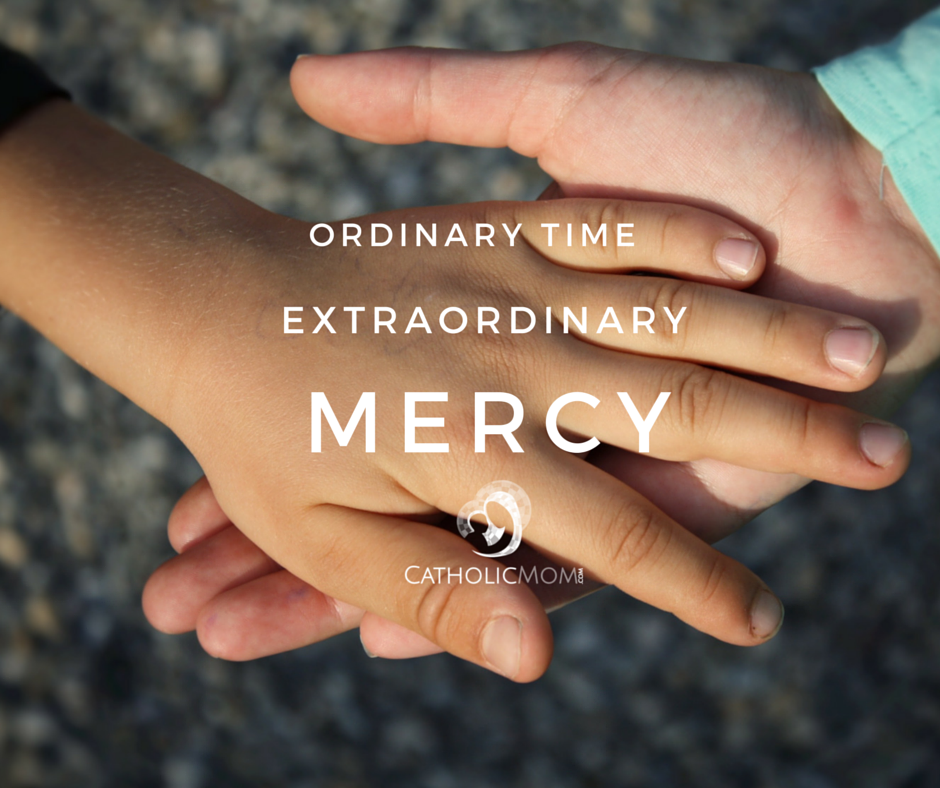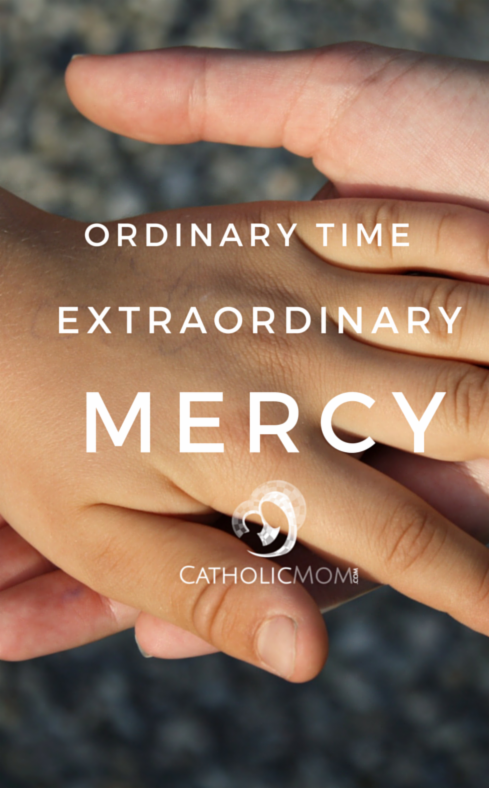This post is part of our Ordinary Time, Extraordinary Mercy series, in which CatholicMom.com contributors will share their own experiences of living the Year of Mercy. Beginning at Pentecost and continuing through the summer, we'll cover many aspects of the Works of Mercy in family life.
As feridas causadas pelos pais nas almas dos filhos certamente são as mais difíceis de curar. Por isso falamos aqui em Doutorado na Escola de Misericórdia. Para conseguir um doutorado, precisamos estudar e nos sacrificar muito e o processo é longo. Da mesma forma, para conseguir agir com misericórdia quando feridos pelos nossos pais, precisamos de muita paciência e muito sacrifício. Mas no fim do processo, receberemos um grande prêmio: a liberdade.
A misericórdia nos torna realmente livres. Livres da mágoa, livres da culpa, livres para amar, livres para servir. Essa é a liberdade que Deus quer nos oferecer através da sua misericórdia, nos convidando a agir com misericórdia, especialmente com nossos pais.
 Never forget, Never forgive. via
Flickr, CC BY-NC-ND 2.0
Never forget, Never forgive. via
Flickr, CC BY-NC-ND 2.0
Pai e mãe deveriam amar seus filhos incondicionalmente e assim serem reflexos do amor de Deus para eles. Eles não tem o “direito” de nos magoar. Só que o ser humano não é perfeito. Pai e mãe não são perfeitos. Eles falham e nós falhamos também. A mágoa e muitas vezes até o rancor se instalaram em nosso coração. O que fazer agora?
Sentir-se rejeitado ou não amado pelos próprios pais (ou por um só deles, pai ou mãe), pode ser uma verdadeira tragédia na vida de qualquer pessoa. Muitos desequilíbrios emocionais e psíquicos são causados por essa ferida na alma. E dói tanto que muitas vezes queremos fingir que ela não existe. Mas nesse Ano da Misericórdia somos convidados a limpar a ferida para que ela possa cicatrizar.
Nada podemos fazer sem a ajuda da graça. Desta forma, o primeiro passo é pedir a graça de conseguir perdoar. Sozinhos não conseguiremos. Façamos como Jesus fez na cruz, pediu ao Pai que perdoasse aqueles que o feriam. Se nós não conseguimos perdoar, então é o Pai que deve perdoar por nós.
Não adianta querer mudar aquilo que já passou. Não adianta querer mudar a outra pessoa. A única pessoa que conseguimos mudar é a nós mesmos. Assim, se não podemos mudar a situação, nós é quem devemos mudar como enxergamos aquele problema.
Em relação a nossos pais, essa realidade é ainda mais forte. Certamente eles não são mais jovens e com a idade os defeitos se acentuam. E pode ser que agora eles precisem de nossos cuidados, de nossa ajuda física e espiritual. Isso é um grande desafio para nós se existe mágoa e ressentimento no relacionamento com nossos pais.
Não é uma questão de esquecer o que fizeram de mal, mas de curar a nossa memória. Precisamos enxergar os acontecimentos com os olhos misericordiosos de Deus. Nosso ego pode exigir justiça, que o mal seja reparado, que o pai ou a mãe que nos magoou, no mínimo, peça perdão. Só que a misericórdia é maior do que a justiça, vai além da justiça.
A misericórdia pede que olhemos para o nosso pai, para a nossa mãe e digamos (mesmo que seja interiormente): “Olha eu sei que o senhor me feriu. Não entendo o motivo. Talvez seja reflexo de suas mágoas, de sua vida dura, das suas próprias feridas. Eu entendo suas limitações. Mas eu não quero mais sofrer com isso. Eu não quero deixar que esse ressentimento prejudique nosso relacionamento. Então eu decido perdoar o senhor. E com a ajuda de Jesus Cristo, tenho certeza que conseguirei.”
O que mais importa no amor não é como nos sentimos – porque os sentimentos podem mudar – mas o que queremos. Querer perdoar é o primeiro grande passo. Uma oração que ajuda muito quando queremos perdoar, mas o coração ainda resiste, é o “Terço do Perdão”. É uma oração muito simples: nas contas grandes do terço, reza-se o pai-nosso e nas contas pequenas, ao invés de rezar as ave-marias, reza-se “eu perdoo a minha mãe e ela me perdoa”. Você pode substituir pela pessoa que você quiser, no lugar de “minha mãe”. Essa oração realiza verdadeiros milagres, pois ao mesmo tempo que você perdoa, pede também o perdão. É um exercício de humildade, pois geralmente não pensamos que precisamos pedir também perdão. Mas nossos pais podem estar magoados conosco.
Como disse o Papa Francisco, na Bula da Misericórdia,
“O perdão é o instrumento colocado nas nossas frágeis mãos para alcançar a serenidade do coração. Deixar de lado o ressentimento, a raiva, a violência e a vingança são condições necessárias para se viver feliz.”
School of Mercy Doctorate – Dealing with Parents
The wounds caused by parents in their children's souls certainly are the most difficult to heal. That's why we're talking about “School of Mercy Doctorate.” To get a doctor's degree, we need to study hard and make many sacrifices, and the process is long. In the same way, to be able to act with mercy when our parents wounded us, we need a lot of patience and many sacrifices. But in the end of the process, we will get a huge prize: our freedom.
Mercy makes us really free. Free from the hurt, free from the guilt, free to love, free to serve. This is the freedom that God wants to give through his mercy, inviting us to act with mercy, especially toward our parents.
Father and mother should love their children unconditionally and being the reflection of God's love to their children. They don't have the “right” to hurt us. But human beings are not perfect. Fathers and mothers aren't perfect. They fail and we fail too. The hurt and many times even the rancor embed themselves in our hearts. What can we do now?
Feeling rejected or not loved by your own parents (or just one of them, father or mother) can be a big tragedy in the life of any person. Many emotional and psychological imbalances are caused by this wound in the soul. And it hurts so much that many times we want to pretend it doesn't exist. But in this Year of Mercy we are invited to clean the wound so it can heal.
We can't do anything without the help of grace. The first step is to ask the grace of forgiveness. Alone, we can't make it. Let's do what Jesus did at the cross: ask the Father to forgive those who were hurting him. If we are not able to forgive, then it is the Father who should forgive for us.
It is useless to want to change what is already past. It is useless to want to change the other person. The only person we can change is ourselves. This way, if we can't change the situation, we should change how we see that problem.
Concerning our parents, this reality is even stronger. Certainly, they are no longer young and with age, the imperfections grow bigger. And it might be that now they need our care, our physical and psychological help. This is a great challenge for us if there is hurt and resentment in our relationship with our parents.
It is not a matter of forgetting what they did wrong, but to heal our memory. We need to see everything that happened with the merciful eyes of God. Our ego might demand justice, that the evil is repaired, that the father or the mother who hurt us, at least, ask forgiveness. But mercy is bigger than justice; it goes beyond justice.
Mercy asks us to look to our father and to our mother and say (even if it is only in our minds): “Look, I know you hurt me. I don't understand the reason. Maybe it is the reflections of your own hurts, of your tough life, of your own wounds. I understand your limitations. But I don't want to suffer with it any longer. I don't want to let this resentment harm our relationship. So I decide to forgive you. And with the help of Jesus Christ, I'm sure I will do it.”
What is most important in love is not how we feel – because feelings may change – but what we will. Willing to forgive is the first big step. One prayer that helps a lot when we want to forgive, but our heart still resists, is the “Forgiveness Chaplet.” It is very simple: on the big beads of the Rosary, you pray the Our Father. On the small beads, instead of praying the Hail Mary, you say “I forgive my mother and my mother forgives me.” You can replace “my mother” with the name of any person you want. This prayer leads to real miracles, because at the same time you forgive, you ask for forgiveness. It's a humility exercise, because usually we don't think that we also need to ask forgiveness. But we might have also hurt our parents.
[Tweet "What is most important in love is not how we feel but what we will. #OTEM"]
As Pope Francis said in the Bull of Indiction of the Jubilee of Mercy,
“Forgiveness is the instrument put in our fragile hands to reach the serenity of the heart. We should put away the resentment, the anger, the violence and revenge as the conditions to live happily.”
Read the other articles in our "Ordinary Time, Extraordinary Mercy" series.
Copyright 2016 Flávia Ghelardi
About the Author

Flávia Ghelardi
Flávia Ghelardi is the mom of four, a former lawyer already "promoted" to full time mom. Flávia published her first book FORTALECENDO SUA FAMÍLIA and is a member of Schoenstatt´s Apostolic Movement. Flávia loves to speak about motherhood and the important role of women, as desired by God, for our society. She blogs at www.fortalecendosuafamilia.blogspot.com.




.png?width=1806&height=731&name=CatholicMom_hcfm_logo1_pos_871c_2728c%20(002).png)
Comments